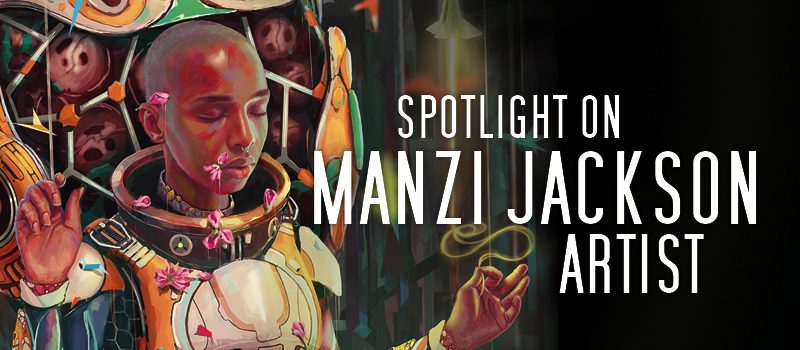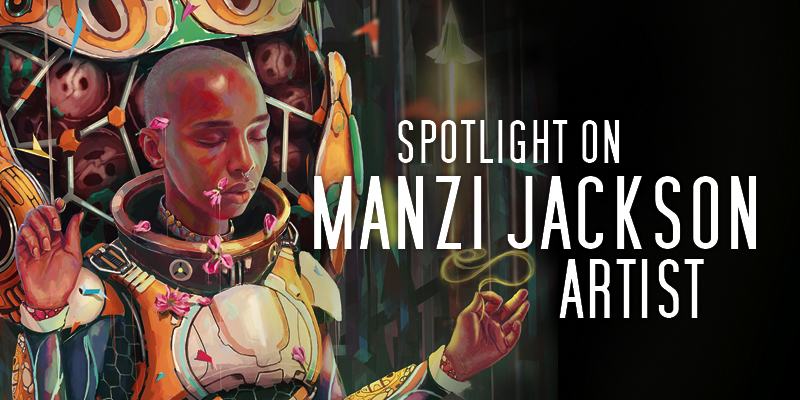Spotlight on Manzi Jackson
Manzi Jackson is a contemporary visual Artist based in Kigali, Rwanda.
He dabbles in surrealist and magical concepts, displayed in his ability to portray the full magical breadth of his subjects with breathtaking, colorful technique.
He’s currently focusing on a body of portrait and figurative works depicting dreamy energy that draws us into a rich and vibrant realm.
His use of flower-draped muses in astronaut suits are characterized in a series of artworks expressing a vibrant spirit in otherworldly atmosphere, as the subjects are manifestations visiting us from alternate, often futuristic, realities, taking us on a cosmic journey and making us wonder about worlds that lie beyond our own.
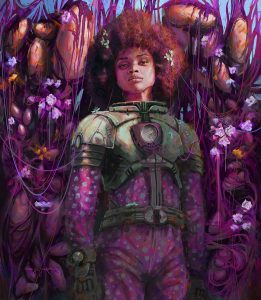 What was your introduction to working in the field of science fiction and fantasy cover art? What were the influences that drew you in?
What was your introduction to working in the field of science fiction and fantasy cover art? What were the influences that drew you in?
I’ve been a huge fan of science fiction and fantasy genre since a young age. My current artworks are majorly influenced by the two genres.
The main advantage of today’s social media is the kind of outreach it can give you. You virtually have access to the world, and my artworks had begun to get noticed. Not long after, I was contacted to do my first fantasy cover art for a major publishing company in 2019. It was Bloomsbury Publishing, and I did the US cover art for Kalynn Bayron’s Cinderella Is Dead. The rest is history.
Talk a bit about one of your most interesting illustration projects. What’s it like to illustrate an author’s work? How do you engage with thework and make it your own while still honoring the source material?
When I’m given a script, I read it and try to immerse myself in the world of the author’s vision as vivid as I possibly can. I work closely with an art director to ensure I’m staying faithful to the source material throughout the entire process. I’m given meticulous instructions about the general atmosphere of the world and characters in them but, there’s room for me to improvise and add creative elements that don’t stray far from the source.
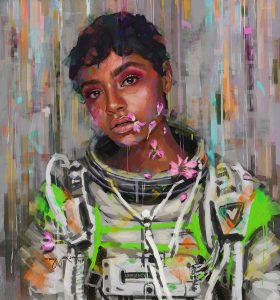 Please tell us about the origins and progress of your ‘‘Take Me To Space’’ series.
Please tell us about the origins and progress of your ‘‘Take Me To Space’’ series.
Take Me To Space is an ongoing visual dialogue focusing and celebrating African women in a technologically advanced world.
I’m interested in using vibrant depictions of women to evoke femininity, perceived through a futuristic lens. I use floral elements to emphasize abundance of life as they partially engulf the muses. This body of artworks is an homage and challenges contemporary norms of gender bias.
What does your workflow look like from concept to realization and do you use digital media? Any unusual techniques?
After reading the script, I do research especially if it’s an unfamiliar subject, and try to collect as many references as I can get. I then begin to build up from there and create different sketches with various compositions. One of the compositions will be chosen, and sometimes elements from different sketches are fused together to make up a new composition. The final step remaining is to work on the final artwork.
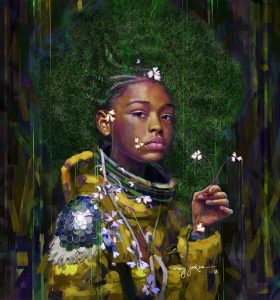 How do you keep it fresh for yourself and keep learning new techniques and improving your craft? Have there been any recent changes or discoveries in your art process, or do you feel settled into something that’s really working for you already?
How do you keep it fresh for yourself and keep learning new techniques and improving your craft? Have there been any recent changes or discoveries in your art process, or do you feel settled into something that’s really working for you already?
There’s always room for improvement. I do sketch quite often in my studio and I find that it keeps things fresh for me. I try not to get too comfortable with the subject in the artworks I create because there’s so much more to explore. There are things I’ve rarely, sometimes never painted before and every now and then, I challenge myself to do studies from them.
It’s easier to do research these days, given the fact that there’s a lot of free online content to learn from. Doing studies on artworks from other artists whose works I admire, or simply observing from life around me, generally keeps my knowledge and skills sharp.
 Cover and interview design by Francesca Myman, art by Manzi Jackson
Cover and interview design by Francesca Myman, art by Manzi Jackson
While you are here, please take a moment to support Locus with a one-time or recurring donation. We rely on reader donations to keep the magazine and site going, and would like to keep the site paywall free, but WE NEED YOUR FINANCIAL SUPPORT to continue quality coverage of the science fiction and fantasy field.
©Locus Magazine. Copyrighted material may not be republished without permission of LSFF.


